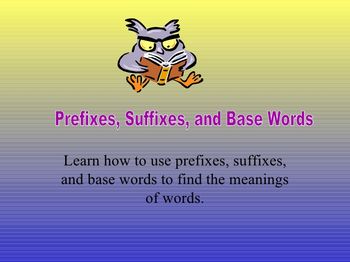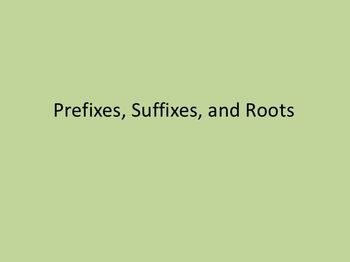16/10/2013
Eliana Dias e Lazuíta Goretti de Oliveira
| Modalidade / Nível de Ensino | Componente Curricular | Tema |
|---|---|---|
| Ensino Médio | Língua Estrangeira | Compreensão oral |
| Ensino Médio | Língua Estrangeira | Produção oral |
| Ensino Médio | Língua Estrangeira | Compreensão leitora |
| Ensino Médio | Língua Estrangeira | Produção escrita |
O que o aluno poderá aprender com esta aula
- Reconhecer os prefixos e os sufixos das palavras;
- aprender sobre a formação das palavras;
- identificar e usar word formation em situações comunicativas.
Duração das atividades
Conhecimentos prévios trabalhados pelo professor com o aluno
Para essa aula, é preciso que o aluno tenha noções básicas da língua inglesa, como, por exemplo, reconhecer e saber utilizar verbos, substantivos, adjetivos e advérbios (parts of speech).
Estratégias e recursos da aula
- Utilização de recursos de multimídia;
- aula expositiva usando o data show;
- utilização de imagens e slides veiculados na internet;
- atividades realizadas individualmente ou em pares;
- uso de atividades xerocopiadas;
- uso de jogos.
Atividade 1
Professor, no laboratório de informática, inicie a aula, apresentando os slides , que introduzem o tema da aula. Peça para que os próprios alunos se revesem na leitura. Dispense o tempo necessário para que realizem as atividades apresentadas nos slides. Corrija-as, solicitando a ajuda dos alunos e tirando as possíveis dúvidas.
http://www.slideshare.net/Patysands/prefix-suffix-and-base-words (acesso em: 27.09.2013);
http://www.slideshare.net/146online/5th-grade-prefixes-suffixes-roots (acesso em: 27.09.2013).

Imagem ilustrativa do site mencionado.

Imagem ilustrativa do site mencionado.
Atividade 2
Professor, peça para que os alunos, em duplas, leiam as explicações e, em seguida, façam os exercícios. A atividade deverá ser xerocopiada e distribuída aos alunos.
PREFIXES and SUFFIXES create new words, usually by modifying or changing the meaning of a ROOT WORD. If we take a root word like EMPLOY (verb) or HAPPY (adjective), we can see how their meaning changes.
*UN + employ + ED = UNEMPLOYED (the verb becomes an adjective with a negative meaning)
* happy + NESS = HAPPINESS (the adjective becomes a noun)
1. PREFIXES like DIS/IN/IM/IR/UN/IL/MIS are used to give an opposite/negative meaning to a word.
A) Task: Give the opposites of the words in the box.
| Possible; loyal; honest; regular; legal; complete; replaceable; effective; popular; fortune; different; kind |
2. SUFFIXES can be used to form a verb, a noun, an adjective and an adverb. Examples:
*dark (adjective) + ness = darkness (noun)
*strength (noun) + en = strengthen (verb)
*probable (adjective) + (l)y = probably (adverb)
*glory (noun) + ous = glorious (adjective)
B) Task: Link the verbs with their correct suffix to form NOUNS and write them down. Follow the example and be careful with the spelling.
Example: imagine – 3 - imagination
a) Imagine 1. – ance …………………………………………………
b) Weak 2. – ity …………………………………………………….
c) Teach 3. – ation …………………….……………………………
d) Infect 4. – sion ………………………………………………….
e) Decide 5. – ence …………………………………………………
f) Argue 6. – er …………………………………………………….
g) Assist 7. – al ……………………………………………..……..
h) Secure 8. – ance ………………………………………………
i) Refuse 9. – ment ……………………………………………….
j) Occur 10. – ion ………………………………………………….
k) Resist 11. - ness ……………………………………………….
3. PREFIXES and SUFFIXES
C) Task: Add a prefix and/or a suffix to the words in the table and put them in the correct sentence. In brackets you´ll find some information on the parts of speech to use.
| PROBABLE COMMUNICATE AGREE CURIOUS ANGER HEALTH RESPONSIBLE FAME HELP LIKE CAREFUL CONCLUDE |
a) The lights are green, but nobody is moving. He is so ................... (adjective)

b) Don´t you know that saying " ................................ Killed the cat?" (noun)

c) I think you should drive more ................ (adverb). You are scaring me.

d) She is a very ................................. (adjective) TV star.

e) They have different opinions on the subject. Their ................................. (noun with a negative meaning) will last forever.

f) Brian is always late for work. He is so ........................... (adjective with a negative meaning).

g) This Math problem is very difficult. Mary didn´t come to ......................................... (noun).

h) He can't see the banana peel. He will ……………… slip and fall. (adverb)

i) You shouldn´t eat so much junk food. It´s very ...................................... (adjective with a negative meaning)

j) Thanks for finding my cat. You´re a very ......................... (adjective) young man.

K) My parents are always fighting. There is no ............................. (noun) between them anymore.

l) I really ............................ (verb with a negative meaning) my packed lunch. It doesn´t smell so good.

Adaptado do site: http://www.englishexercises.org/makeagame/viewgame.asp?id=3677 (acesso em: 27.09.2013)
Atividade 3
Apresente a seguinte explicação para os alunos, projetando o seguinte texto:
Sometimes raising awareness to this word formation aspect of English can be the light that dispels the darkness of dictionary worship.
Since English is a language that has thousands of words from other languages, a brief etymology of commonly used prefixes and suffixes would do much good.
For example the OCT prefix comes from the Latin OCTO which means EIGHT. If you look at most English words beginning with OCT, the meaning is never too far from eight. So ask yourself for example: What is an octopus, octogenarian, octagon, octave, and octet?
In a similar line, TELE- has its roots in Greek, which means far or distant. So what do words like telecommunication, television, telephone and telex have in common?
Fonte: http://www.esl-galaxy.com/reading.html (acesso em: 27.09.2013)
Em seguida, entregue o exercício xerocopiado a ser realizado em pares. Dispense um tempo de, aproximadamente, 10 minutos e inicie a correção, oralmente, responsabilizando cada aluno pela leitura de uma questão. Verifique se há a participação de todos na realização das atividades das aulas, revesando, sempre, os turnos de fala.
Atividade 4
Atividade 5
Para o último momento da aula, sugira atividades lúdicas. Peça para que os alunos acessem o site http://www.vocabulary.co.il/suffixes/high-school/divide-the-suffix/ (acesso em: 27.09.2013) que contém vários jogos e atividades lúdicas sobre o tema da aula. Os alunos podem continuar com os jogos em casa e poderão trazer dúvidas, caso as tenham.
Recursos Complementares
Para uma lista de word formation:
http://www.bedavaingilizce.com/advanced/wf/wfa.htm (acesso em: 27.09.2013);
http://wa.amu.edu.pl/wa/files/WORDBUILDING%20LIST%201BA%202BA%203BA%201MA%20EFL%20EXAM%202011-12.pdf (acesso em: 27.09.2013);
http://www.tinyteflteacher.co.uk/learning-english/FCE/word-formation-verbs.html (acesso em: 27.09.2013);
http://busyteacher.org/10659-word-formation-list.html (acesso em: 27.09.2013);
http://timsenglishclasses.wikispaces.com/CAE+Word+Formation+List (acesso em: 27.09.2013);
http://www.victoria.ac.nz/lals/resources/academicwordlist/publications/awlsublists1.pdf (acesso em: 27.09.2013)
Para um apoio teórico sobre o tema, acesse:
http://wac.colostate.edu/books/sound/chapter5.pdf (acesso em: 27.09.2013);
http://www.inglesvip.com/grammar/word-formation-prefix-and-suffix.html (acesso em: 27.09.2013)
Para slides sobre a formação de palavras, acesse:
https://skydrive.live.com/view.aspx?resid=79CFF252BEEA0A7D!191&app=PowerPoint&authkey=!AMcd3PQqrTgRqos (acesso em: 27.09.2013);
http://ce.sharif.edu/courses/86-87/1/ce211/resources/root/Extra%20Notes/extra3.pdf (aceso em: 27.09.2013)
Para exercícios, acesse:
http://www.dcielts.com/ielts-vocabulary/awl-exercises/awl-list-1-exercises/ (acesso em: 27.09.2013);
http://www.esl-galaxy.com/prefixsuffix.html (acesso em: 27.09.2013)
Para uma lista de jogos sobre a formação de palavras, acesse:
http://www.vocabulary.co.il/suffixes/ (acesso em: 28.09.2013)
Para uma aula em vídeo, acesse:
http://www.youtube.com/watch?v=EYZCXDEja0g (acesso em: 28.09.2013)
Avaliação
Os alunos deverão ser avaliados em todos os momentos da aula, observando a participação, envolvimento e interesse nas atividades propostas pelo professor.
Em um segundo momento, os alunos deverão estudar as tabelas com prefixos e sufixos sugeridas no item 'Recursos Complementares' desta aula. Em seguida, com a ajuda de um dicionário, deverão procurar e anotar mais dez diferentes palavras com prefixos e sufixos. Um mural poderá ser montado na sala, com a exposição de todas as palavras. As palavras deverão ser lidas por cada aluno, verificando a pronúncia correta.
Sem estrelas 0 classificações
- Cinco estrelas 0/0 - 0%
- Quatro estrelas 0/0 - 0%
- Três estrelas 0/0 - 0%
- Duas estrelas 0/0 - 0%
- Uma estrela 0/0 - 0%
Denuncie opiniões ou materiais indevidos!
- Sugestão de aula
- Aulas
- Coleções de aulas
- Criar aula
- Criar individual
- Criar em equipe
- Gerenciar equipes
- Minhas aulas
- Orientações
- Criando equipes
- Dicas para a produção de aulas
- Reflexões pedagógicas
- Utilizando a ferramenta
- Artigo: portal educacional
- Estatísticas de uso do Portal
- Estatísticas de aulas
- Estatísticas de recursos
- Estatísticas de visitas
- Recursos utilizados em aulas
- Reflexões pedagógicas
- Informações de cursos
- Cursos
- e-Proinfo
- Materiais de cursos
- Materiais de estudo
- Artigos e publicações
- Assuntos relevantes
- Avaliações
- Ciência do cotidiano
- Destaques internacionais
- Dicas práticas
- Educação profissional e tecnológica
- Entrevistas
- Estratégias pedagógicas
- Inovações tecnológicas
- Materiais de cursos
- Materiais de evento
- Orientações e diretrizes
- Parâmetros e referencias
- Programas em vídeos
- Tutoriais
- TVescola
- Ferramentas do portal
- Fórum
- Portal do Youtube
- Compartilhando apresentação
- Ferramentas pela internet
- Blog
- Compartilhe vídeos
- Comunicação on-line
- Crie e compartilhe apresentações
- Edite e compartilhe fotos
- Escrita colaborativa
- Junte-se a uma comunicade
- Lista de discussão
- Organize e compartilhe favoritos
- Podcast
- Rádio/TVs Universitárias e outros
- Redes Sociais
- Robô Ed
PLATAFORMA FREIRE
- Bibliotecas
- Capacitação Proinfo Integrado
- Cultura
- Dicionários, tradutores e enciclopédias
- Educação inclusiva
- Geoprocessamentos
- Inclusão digital
- Infográficos
- Jogos educativos
- Jornais
- Museus
- Observatórios e planetários
- Organizações governamentais
- Plataformas educacionais
- Portais educacionais e outros
- Portal MEC
- Prêmio professores do Brasil
- Produções de professores
- Projetos de escolas
- Projetos inovadores
- Projetos sociais e educacionais
- Rádio escola
- Recursos digitais
- Revistas
- Sites de busca
- Sites temáticos do portal e TVescola
- Softwares de edição e outros
- Softwares educacionais
- Um computador por aluno

- Ryan Oksenhorn
- Ryan Snow
- Sergio Caldara
- Shane Miler
- Shane Herzog
- Sotirios Papavasilopoulos
- Stephen JB Thomas
- Tarah
- Valera Nazarov
- ZbigniewMa K Flakus


